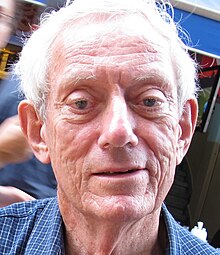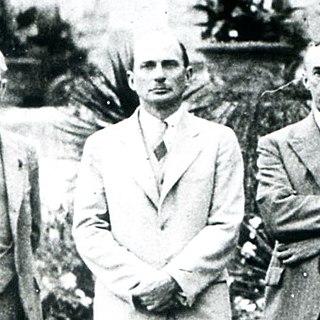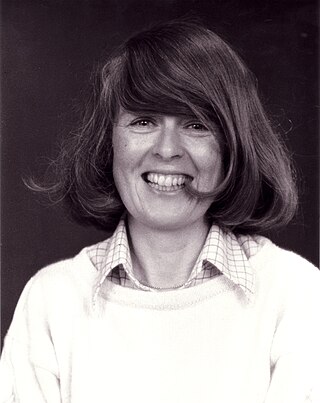
John Vincent Fleming (born May 20, 1936) is an American literary scholar and the Louis W. Fairchild '24 Professor of English and Comparative Literature, Emeritus, at Princeton University. [1] [2]

John Vincent Fleming (born May 20, 1936) is an American literary scholar and the Louis W. Fairchild '24 Professor of English and Comparative Literature, Emeritus, at Princeton University. [1] [2]
Fleming was born on May 26, 1936 [3] and graduated from The University of the South in 1958. After studying at Jesus College, Oxford, as a Rhodes Scholar, Fleming earned his Ph.D. in medieval literature from Princeton University in 1963 after completing a doctoral dissertation, titled "The Roman de la Rose and its manuscript illustrations", under the supervision of D. W. Robertson Jr. [4] He spent two years as an instructor in English at the University of Wisconsin–Madison before returning to Princeton as an assistant professor of English in 1965. Beginning in 1978 he took up a joint appointment in the Department of Comparative Literature. His fields of expertise included medieval English, French, and Latin literatures, and the history and culture of the Franciscan Order in the Middle Ages. He is perhaps best known in Princeton for his popular and erudite lecture course on Geoffrey Chaucer.
From 1995 to 2006, he authored a weekly column in The Daily Princetonian , titled "Gladly Lerne, Gladly Teche" (a reference to Chaucer's Canterbury Tales ). He has revived his column under its same name as a blog attached to his website, www.johnvfleming.com. The blog has published a weekly essay, uninterrupted, for more than ten years. He served for several years as a Commissioner of Higher Education of Middle States. He was active in numerous learned societies, including the Medieval Academy of America, which he served as its president. Fleming is a Fellow of the American Academy of Arts and Sciences and of the American Philosophical Society. At Princeton, he was the dissertation director of renowned scholars of medieval literature Carolyn Dinshaw (New York University) and Steven Justice (University of California, Berkeley).
He is married to Joan E. Fleming, a retired priest in the Episcopal Diocese of New Jersey. They are the parents of Richard Arthur Fleming (b. 1964), a sound-recording engineer, artist, and travel writer; Katherine Elizabeth Fleming (b. 1966), a prize-winning historian and university administrator, and current President and CEO of the Getty Foundation; and Luke Owles Fleming (b. 1978), a linguistic anthropologist.
While at Princeton, his wit was widely appreciated and often recorded in a sporadic column titled "Professorial Chrestomathy," including such remarks from his lectures as "As of this morning, you have heard all my jokes and seen all my shirts."
In 2006, after 40 years at Princeton, he moved to emeritus status. Following his retirement, he was honored with two festschrift volumes prepared by former students and other colleagues. The first, Defenders and Critics of Franciscan Life: Essays in Honor of John V. Fleming, ed. Michael F. Cusato and Guy Geltner (Brill: 2009), reflects his work in Franciscan Studies. The second, Sacred and Profane in Chaucer and Late Medieval Literature: Essays in Honour of John V. Fleming, ed. Robert Epstein and William Robins (Toronto: 2010), reflects his contributions to the study of medieval English vernacular literature. He is an elected member of the Guild of Scholars of The Episcopal Church. In 2021 Princeton University awarded him the degree of Doctor of Letters, honoris causa. In retirement Fleming has expanded his field of scholarly publication beyond medieval subjects. His first trade book, a study of classic anti-Communist literature entitled The Anti-Communist Manifestos was published in New York by W. W. Norton in August, 2009. In 2010 it was awarded the annual book prize of the New Jersey Council for the Humanities. This was followed by The Dark Side of the Enlightenment from the same publisher in 2013. He returned to formal scholarly publication in 2017 with a monograph on the Portuguese Renaissance poet, Luis de Camões, and he continues to publish occasional commissioned essays and book reviews.
Pierce the Ploughman's Crede is a medieval alliterative poem of 855 lines, lampooning the four orders of friars.

Roger Sherman Loomis (1887–1966) was an American scholar and one of the foremost authorities on medieval and Arthurian literature. Loomis is perhaps best known for showing the roots of Arthurian legend, in particular the Holy Grail, in native Celtic mythology.
Elizabeth Helen Cooper,, known as Helen Cooper, is a British literary scholar. From 2004 to 2014, she was Professor of Medieval and Renaissance English at the University of Cambridge, and a fellow of Magdalene College, Cambridge.

Earl Roy Miner was a professor at Princeton University, and a noted scholar of Japanese literature and especially Japanese poetry; he was also active in early modern English literature .He was a major critical authority on John Dryden. He earned his bachelor's degree in Japanese studies and master's and doctoral degrees in English from the University of Minnesota; with this PhD, he joined the English faculty at Williams College (1953–1955) and at UCLA (1955–1972), whereupon he joined Princeton in 1972.
Seth Lerer is an American scholar and Professor of English. He specializes in historical analyses of the English language, and in addition to critical analyses of the works of several authors, particularly Geoffrey Chaucer. He is a Distinguished Professor Emeritus of Literature at the University of California, San Diego, where he served as the Dean of Arts and Humanities from 2009 to 2014. He previously held the Avalon Foundation Professorship in Humanities at Stanford University. Lerer won the 2010 Truman Capote Award for Literary Criticism and the 2009 National Book Critics Circle Award in Criticism for Children’s Literature: A Readers’ History from Aesop to Harry Potter.
Derek Stanley Brewer was a Welsh medieval scholar, author and publisher.
Durant Waite Robertson Jr. was a scholar of medieval English literature and especially Geoffrey Chaucer. He taught at Princeton University from 1946 until his retirement in 1980 as the Murray Professor of English, and was "widely regarded as this [the twentieth] century's most influential Chaucer scholar".

Contact between Geoffrey Chaucer and the Italian humanists Petrarch or Boccaccio has been proposed by scholars for centuries. More recent scholarship tends to discount these earlier speculations because of lack of evidence. As Leonard Koff remarks, the story of their meeting is "a 'tydying' worthy of Chaucer himself".
Johannes August Hermann (John) Koch was one of the most prolific modern scholars of medieval English literature, especially the works of Geoffrey Chaucer.
Karl Heinz Göller (1924–2009) was a noted German medievalist and founder of the Mediävistenverband, the German association for medieval studies.
Richard Utz is a German-born medievalist who has spent much of his career in North America. He specializes in medieval studies, and served as president of the International Society for the Study of Medievalism (2009–2020).
Henry Ansgar Kelly is distinguished research professor of English at the University of California, Los Angeles.
Russell A. Peck was an American medievalist, scholar of medieval literature, and author. At the time of his retirement in 2014, he was John Hall Deane Professor of English at the University of Rochester, where he began teaching in 1961.
Alastair J. Minnis is a Northern Irish literary critic and historian of ideas who has written extensively about medieval literature, and contributed substantially to the study of late-medieval theology and philosophy. Having gained a first-class B.A. degree at the Queen's University of Belfast, he matriculated at Keble College, Oxford as a visiting graduate student, where he completed work on his Belfast Ph.D., having been mentored by M.B. Parkes and Beryl Smalley. Following appointments at the Queen's University of Belfast and Bristol University, he was appointed Professor of Medieval Literature at the University of York; also Director of the Centre for Medieval Studies and later Head of English & Related Literature. From 2003 to 2006, he was a Humanities Distinguished Professor at Ohio State University, Columbus, from where he moved to Yale University. In 2008, he was named Douglas Tracy Smith Professor of English at Yale. He retired in 2018, and is now living in the Scottish Borders. Professor Minnis is a Fellow of the English Association, UK (2000), a Fellow of the Medieval Academy of America (2001), and an Honorary Member of the Royal Irish Academy (2016). From 2012 to 2014, he served as president of the New Chaucer Society. Currently, he is Vice-President of the John Gower Society. He was General Editor of the Cambridge University Press series Cambridge Studies in Medieval Literature from 1987 to 2018, and holds an honorary master's degree from Yale (2007) and an honorary doctorate from the University of York (2018). The University of York also bestowed on him the honorific title of Emeritus Professor of Medieval Literature (2018).
David Lyle Jeffrey is a Canadian-American scholar of literature and religion, currently a Distinguished Senior Fellow at the Baylor Institute for Studies in Religion. He was elected a Fellow of the Royal Society of Canada (1996-). In 2003 he was given the Lifetime Achievement Award of the Conference of Christianity and Literature.

Gillian Lesley "Jill" Mann, FBA, is a scholar known for her work on medieval literature, especially on Middle English and Medieval Latin.
Norman Francis Blake was a British academic and scholar specialising in Middle English and Early Modern English language and literature on which he published abundantly during his career.
Christopher Cannon is a medievalist at Johns Hopkins University. He is currently Bloomberg Distinguished Professor of English and Classics, previously Chair of Classics, and from 2020, Vice Dean for the Humanities and Social Sciences in the Krieger School of Arts and Sciences. His research and writings have focused on the works of Geoffrey Chaucer, early Middle English, and elementary learning in the Middle Ages.
Thorlac Francis Samuel Turville-Petre is an English philologist who is Professor Emeritus and former head of the School of English at the University of Nottingham. He specializes in the study of Middle English literature.

Ethelbert Talbot Donaldson was a scholar of medieval English literature, known for his 1966 translation of Beowulf and his writings on Chaucer's poetry.